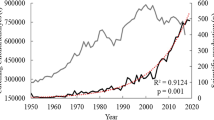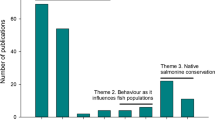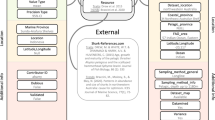Abstract
Research effort is unevenly distributed across species, which can cause important biases in our understanding of evolutionary and ecological processes and affect conservation decisions. For example, many shark species remain understudied, despite the fact that sharks play fundamental roles in marine ecosystems and are particularly affected by fisheries. Assessing and acknowledging these differences in research effort across shark species is a key step to improving our knowledge and management of shark populations as it allows researchers to both target species in need of research and control for potential biases when performing comparative analyses. I provide here an index of research effort (the number of articles published between 1978 and 2014 listed in the Zoological Record database) for 509 shark species that can be downloaded and utilized in future comparative analyses. I then show that research effort is not randomly distributed across species within the clade, but is significantly predicted by taxonomy, geography, ecology, life history and extinction risk. For example, large species that occur across a large range of latitudes and at shallow minimum depths have attracted considerably more research. The consequence is a strong bias in our knowledge of sharks towards species that are not an unbiased representative sample of the clade. The database and the patterns demonstrated here call for more awareness of the biases in research effort and their potential consequences, not only for practical considerations such as the interpretation of the results of comparative analyses and the assessment of extinction risk, but also for our basic understanding of the ecological roles of sharks.



Similar content being viewed by others
References
Albert C, Luque GM, Courchamp F (2018) The twenty most charismatic species. PLoS ONE 13:e0199149. https://doi.org/10.1371/journal.pone.0199149
Arnold C, Nunn CL (2010) Phylogenetic targeting of research effort in evolutionary biology. Am Nat 176:601–612
Barker MJ, Schluessel V (2005) Managing global shark fisheries: suggestions for prioritizing management strategies. Aquat Conserv Mar Freshw Ecosyst 15:325–347. https://doi.org/10.1002/aqc.660
Brito D, Oprea M (2009) Mismatch of research effort and threat in avian conservation biology. Trop Conserv Sci 2:353–362
Colléony A, Clayton S, Couvet D et al (2017) Human preferences for species conservation: animal charisma trumps endangered status. Biol Conserv 206:263–269. https://doi.org/10.1016/j.biocon.2016.11.035
Compagno L, Dando M, Fowler S (2005) Sharks of the world. Princeton University Press, Princeton
de Lima RF, Bird JP, Barlow J (2011) Research effort allocation and the conservation of restricted-range island bird species. Biol Conserv 144:627–632. https://doi.org/10.1016/j.biocon.2010.10.021
Ducatez S, Lefebvre L (2014) Patterns of research effort in birds. PLoS ONE 9:e89955. https://doi.org/10.1371/journal.pone.0089955
Ducatez S, Shine R (2017) Drivers of extinction risk in terrestrial vertebrates. Conserv Lett 10:186–194. https://doi.org/10.1111/conl.12258
Dulvy NK, Fowler SL, Musick JA et al (2014) Extinction risk and conservation of the world’s sharks and rays. Elife 3:e00590
Ferretti F, Worm B, Britten GL et al (2010) Patterns and ecosystem consequences of shark declines in the ocean. Ecol Lett 13:1055–1071. https://doi.org/10.1111/j.1461-0248.2010.01489.x
Froese E, Pauly D (2017) FishBase. https://www.fishbase.org. Accessed Jan 2017
Garamszegi LZ, Møller AP (2010) Effects of sample size and intraspecific variation in phylogenetic comparative studies: a meta-analytic review. Biol Rev 85:797–805. https://doi.org/10.1111/j.1469-185X.2010.00126.x
Garamszegi LZ, Møller AP (2011) Nonrandom variation in within-species sample size and missing data in phylogenetic comparative studies. Syst Biol 60:876–880. https://doi.org/10.1093/sysbio/syr060
Garamszegi LZ, Møller AP (2012) Untested assumptions about within-species sample size and missing data in interspecific studies. Behav Ecol Sociobiol 66:1363–1373. https://doi.org/10.1007/s00265-012-1370-z
González-Suárez M, Lucas PM, Revilla E (2012) Biases in comparative analyses of extinction risk: mind the gap. J Anim Ecol 81:1211–1222. https://doi.org/10.1111/j.1365-2656.2012.01999.x
Heithaus MR, Frid A, Wirsing AJ, Worm B (2008) Predicting ecological consequences of marine top predator declines. Trends Ecol Evol 23:202–210. https://doi.org/10.1016/j.tree.2008.01.003
IHO (1953) Limits of oceans and seas, 3rd. International Hydrographic Organization, Monte-Carlo
ISAF (2019) Internatonal shark attack file. https://www.floridamuseum.ufl.edu/shark-attacks/. Accessed Feb 2019
IUCN (2017) The IUCN red list of threatened species. Version 2017-3. http://www.iucnredlist.org. Accessed Jan 2017
Kellogg EA, Shaffer HB (1993) Model organisms in evolutionary studies. Syst Biol 42:409–414. https://doi.org/10.1093/sysbio/42.4.409
Mieras PA, Harvey-Clark C, Bear M et al (2017) Chapter five—the economy of shark conservation in the northeast pacific: the role of ecotourism and citizen science. In: Larson SE, Lowry D (eds) Advances in marine biology. Academic Press, Cambridge, pp 121–153
Molina JM, Cooke SJ (2012) Trends in shark bycatch research: current status and research needs. Rev Fish Biol Fish 22:719–737. https://doi.org/10.1007/s11160-012-9269-3
Morato T, Watson R, Pitcher TJ, Pauly D (2006) Fishing down the deep. Fish Fish 7:24–34
Randhawa HS, Poulin R, Krkošek M (2015) Increasing rate of species discovery in sharks coincides with sharp population declines: implications for biodiversity. Ecography 38:96–107. https://doi.org/10.1111/ecog.00793
Rasmussen T, Randhawa H (2018) Host diet influences parasite diversity: a case study looking at tapeworm diversity among sharks. Mar Ecol Prog Ser 605:1–16. https://doi.org/10.3354/meps12751
Robison BH (2009) Conservation of deep pelagic biodiversity. Conserv Biol 23:847–858. https://doi.org/10.1111/j.1523-1739.2009.01219.x
Roff G, Doropoulos C, Rogers A et al (2016) The ecological role of sharks on coral reefs. Trends Ecol Evol 31:395–407. https://doi.org/10.1016/j.tree.2016.02.014
Simpfendorfer CA, Kyne PM (2009) Limited potential to recover from overfishing raises concerns for deep-sea sharks, rays and chimaeras. Environ Conserv 36:97. https://doi.org/10.1017/S0376892909990191
Smith SE, Au DW, Show C (1998) Intrinsic rebound potentials of 26 species of Pacific sharks. Mar Freshw Res 49:663. https://doi.org/10.1071/MF97135
Sol D, Duncan RP, Blackburn TM et al (2005) Big brains, enhanced cognition, and response of birds to novel environments. Proc Natl Acad Sci USA 102:5460–5465
Weigmann S (2016) Annotated checklist of the living sharks, batoids and chimaeras (Chondrichthyes) of the world, with a focus on biogeographical diversity: annotated global checklist of chondrichthyes. J Fish Biol 88:837–1037. https://doi.org/10.1111/jfb.12874
Weigmann S (2017) Reply to Borsa (2017): Comment on ‘Annotated checklist of the living sharks, batoids and chimaeras (Chondrichthyes) of the world, with a focus on biogeographical diversity by Weigmann (2016)’. J Fish Biol 90:1176–1181. https://doi.org/10.1111/jfb.13234
Worm B, Davis B, Kettemer L et al (2013) Global catches, exploitation rates, and rebuilding options for sharks. Mar Policy 40:194–204. https://doi.org/10.1016/j.marpol.2012.12.034
Acknowledgements
I thank Jayna DeVore for providing photos, for her help designing Fig. 1, and for her very helpful comments and language editing of the manuscript. I also thank two anonymous reviewers for suggestions that helped in improving the manuscript.
Author information
Authors and Affiliations
Corresponding author
Ethics declarations
Conflict of interest
The author declares that no competing interests exist.
Additional information
Publisher's Note
Springer Nature remains neutral with regard to jurisdictional claims in published maps and institutional affiliations.
Electronic supplementary material
Below is the link to the electronic supplementary material.
Rights and permissions
About this article
Cite this article
Ducatez, S. Which sharks attract research? Analyses of the distribution of research effort in sharks reveal significant non-random knowledge biases. Rev Fish Biol Fisheries 29, 355–367 (2019). https://doi.org/10.1007/s11160-019-09556-0
Received:
Accepted:
Published:
Issue Date:
DOI: https://doi.org/10.1007/s11160-019-09556-0




